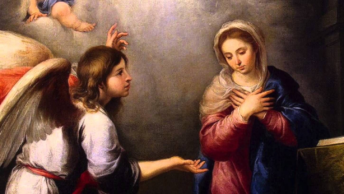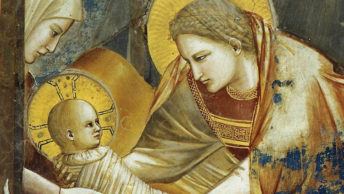Sir Isaac Newton, the famous mathematician and scientist who, among many other great achievements, discovered the law of gravity, had a dog named Diamond—and one day Diamond ended up causing him immense trouble and grief. Newton had spent eight years working on a very important book—and back in the 17th century, of course, there were no word processors or copy machines; the single copy of his great manuscript was written out by hand. Coming home one day, Newton discovered that Diamond had knocked over a lighted candle, thereby setting fire to the only copy of the book. This was a severe setback, but Newton couldn’t be angry at a dog that didn’t know what it had done. He simply said, “Diamond, little do you know the labor and trouble to which you have put your master.” Then, instead of considering the book lost forever, he calmly sat down and started writing it all over (Anthony P. Castle, Quotes & Anecdotes, p. 63).
We’ve all experienced things which severely try our patience; if you’re like me, your response is nowhere near as calm as Newton’s was. And yet, his approach, though very difficult, is the right one; we accomplish more by going about our duties, even under severe conditions, than by raging at things we can’t change. This is especially true in terms of personal growth and of coming closer to God. If we wish to be part of the Kingdom of Heaven, we must be humble and faithful servants, and we must patiently do our best to fulfill the mission the Lord has given us.
God’s plan is always unfolding, but because we don’t have His eternal perspective, it’s easy for us to lose sight of this truth. However, it is important to understand that the Lord will save us and bless us, but in His own time and in His own way. While we await this, we must be both patient, and active in doing His will. The prophet Isaiah describes the miracles God will work for His people: the desert will become fertile, parched land will blossom with flowers, the deaf will hear, the blind see, the lame will walk, and the mute will speak. There will be no more sorrow or mourning; everyone who sincerely worships the Lord will know His peace.
St. James tells us that we must be patient until this comes about. Many of the early Christians were disappointed that the Lord seemed to be taking a long time to return. Patience is offered here as the only proper response, even though it’s often hard to put into practice. James uses the farmer as an example, for he has to wait as the seed takes root and grows, and there’s nothing he can do to speed up the process. The farmer does his part, and then trusts that the Lord will do His. So it is with us. St. James also reminds us that the prophets endured suffering; this was a sign of their closeness to God. If we wish to grow closer to the Lord, we too can patiently await Christ’s coming, and offer up our trials, difficulties, and frustrations as a sacrifice for His glory.
In the Gospel of Matthew (11:2-11), Jesus says something about John the Baptist, something about Himself, and something about all who follow Him. In response to John’s question on whether He is the expected Messiah, Our Lord states that He heals the blind, the deaf, the leprous, and the lame, and He preaches the good news to the poor—in short, He is the Messiah, for He fulfills everything the prophet Isaiah predicted (35:1-6, 10). Jesus then announces to the crowd that John the Baptist is a prophet and the Lord’s own messenger, the greatest man ever born of a woman. However, even the least person in God’s Kingdom is greater than John. This means, therefore, that being a disciple of Christ is the greatest honor we can ever aspire to—and we are called to be Jesus’ followers.
All of the saints recognized the importance of patience; St. Augustine called it the “companion of wisdom,” and St. Gregory the Great described patience as “the root and guardian of all virtues.” Because of our sinful human nature, spiritual growth will not come quickly, easily, or automatically; we must persevere in using God’s grace if we want to grow in holiness and fulfill our mission in life—but that won’t happen if we become impatient or give up too quickly. Therefore, we must strive to grow in patience, even if, for most of us, this will be a lifelong struggle. St. Padre Pio, the holy Capuchin priest who died in 1968, suggests that we must pray for God’s help as soon as we notice any feeling of impatience arising in us, while also reflecting on how patiently Jesus bore His sufferings and humiliations on Good Friday. As St. Therese of Lisieux recognized, we don’t need to perform miracles or heroic deeds in order to become saints; merely trying to react with patience to all the problems and annoyances of daily life will help us make major progress in becoming holy.
We all have numerous opportunities to be patient with one another: parents and children, adults and young people, employees and their bosses, students and teachers, fast drivers and slower drivers, parishioners and pastors, and so on. In addition, there are many daily chances to grow in this vitally important virtue: while waiting in a slow-moving checkout line, or being stuck in traffic, or trying to figure out complicated instructions for an electronic device, or coping with an uncooperative computer, or while navigating through a business’s lengthy voicemail process in hopes of speaking a real person about a customer service problem. These routine experiences might not seem like moments of grace, but our patient response can make them such—and stretching and exercising our souls in this manner will make it easier to continue trusting in God and answering His call, even when we’re tired, confused, lonely, worried, or depressed. God’s Kingdom is coming—that we know. Exactly when and how we’ll enter into it isn’t yet clear; patience is called for. Until our own particular time comes, Jesus asks us simply to trust in Him and live out our faith each day. This is how we prepare for the Lord’s Kingdom; this is how we prepare His way.








